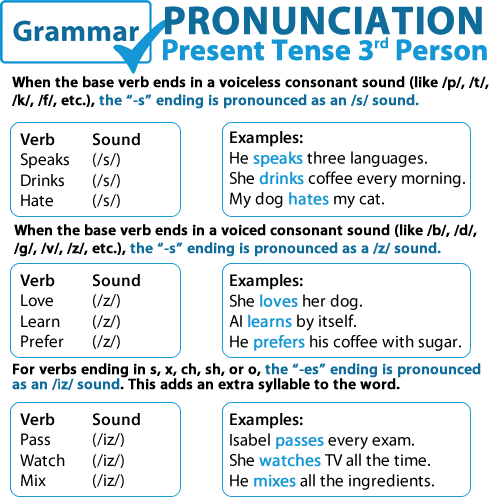Demystifying the Pronunciation of “-s/-es” in English Present Tense Verbs
Are you puzzled by the pronunciation of the “-s” or “-es” endings in English verbs when referring to the third person singular in the present tense? Fear not, for you’re not alone. Mastering this aspect of pronunciation is crucial for effective communication in English. In this blog post, we’ll delve into the rules and variations of pronouncing “-s/-es” endings, helping you navigate this linguistic terrain with confidence.
Understanding the Basics
In English, verbs typically undergo changes when referring to different subjects, such as first person singular (I), second person singular (you), or third person singular (he/she/it). Today, we’ll focus on the third person singular, where the verb often takes on the “-s” or “-es” ending in the present tense.
The Rule: Adding “-s/-es” for Third Person Singular
The general rule is simple: when forming the present tense for third person singular subjects (he/she/it), most verbs add an “-s” to the base form of the verb. For example:
- Walk becomes Walks
- Speak becomes Speaks
- Run becomes Runs
However, some verbs require an “-es” ending instead of just “-s”. This typically happens when the base verb ends in s, x, ch, sh, or o.
Examples:
- Pass becomes Passes
- Fix becomes Fixes
- Watch becomes Watches
- Go becomes Goes
- Do becomes Does
Pronunciation Variations
Now, let’s tackle the pronunciation nuances associated with these endings.
/s/ Sound
When the base verb ends in a voiceless consonant sound (like /p/, /t/, /k/, /f/, etc.), the “-s” ending is pronounced as an /s/ sound.
Examples:
- Speaks(/s/) – He speaks three languages
- Drinks (/s/) – She drinks coffee every morning.
- Hates (/s/) – My dog hates my cat.
/z/ Sound
When the base verb ends in a voiced consonant sound (like /b/, /d/, /g/, /v/, /z/, etc.), the “-s” ending is pronounced as a /z/ sound.
Examples:
- Love (/z/) – She loves her dog.
- Learn (/z/) – AI learns by itself.
- Prefer (/z/) – He prefers his coffee with sugar.
- Go (/z/) – He goes to school every day.
/iz/ Sound
For verbs ending in s, x, ch, sh, or o, the “-es” ending is pronounced as /iz/. This adds an extra syllable to the word.
Examples:
- Passes (/iz/) – Isabel passes every exam.
- Watches (/iz/) – She watches TV all the time.
- Mix (/iz/) – He mixes all the ingredients.

Practice Makes Perfect
The key to mastering the pronunciation of “-s/-es” endings lies in practice and repetition. Engage in speaking exercises, listen to native speakers, and familiarize yourself with the sound patterns. Over time, you’ll develop a natural feel for the correct pronunciation.
Conclusion
Navigating the pronunciation of “-s/-es” endings in the third person singular present tense verbs may seem daunting at first, but with an understanding of the rules and consistent practice, you’ll make significant strides in your English language journey. Embrace the challenge, keep practicing, and soon enough, pronouncing these endings will become second nature. Happy learning!
